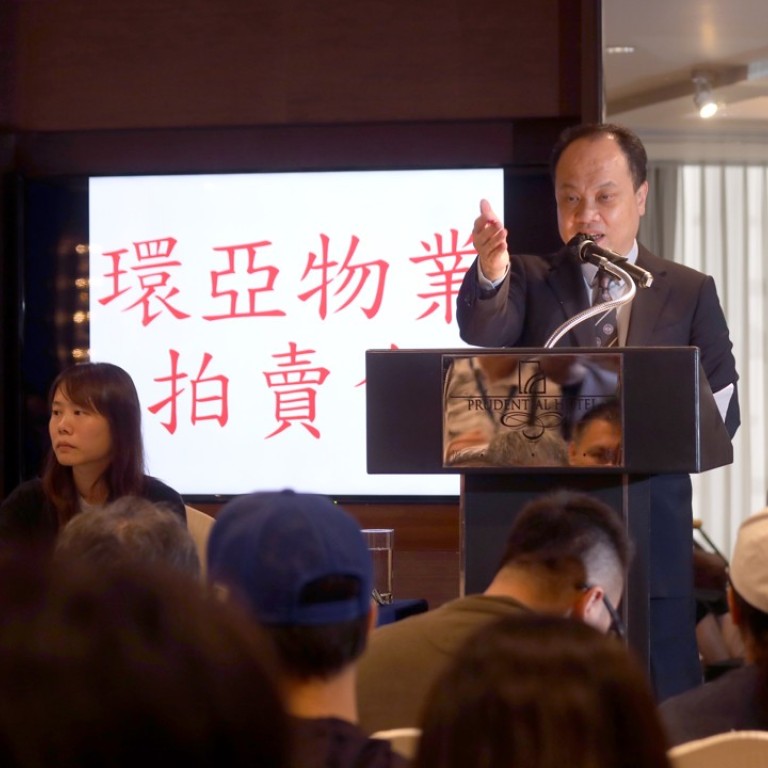
In latest sign Hong Kong is shifting to a buyer’s market, auctioneers having trouble selling foreclosed homes
- At an auction on Tuesday, only two of nine flats sell, as prospective buyers get picky and hope prices will fall even more.
It’s not just developers that are having trouble selling flats in Hong Kong. Now auctioneers are struggling to get high enough bids to clear out foreclosed homes.
A year ago, property prices were soaring, and auctioneers routinely saw new or used homes that had been repossessed by banks receive multiple bids before the hammer fell.
But not now.
At an auction Tuesday, only two out of nine foreclosed homes offered were sold, despite a high turnout of 65 prospective buyers. While the two that sold saw a run-up in bids, five couldn’t get the asking price and two drew no bids at all.
“Buyers expect (flat) prices to drop further,” said Tsang Kit-chun, an auctioneer of AA Property Auctioneers. “Why would they offer high prices when they thought they could buy more cheaply later?”
Tsang attributed the “downbeat sentiment” to the worsening US-China trade war, rising prime mortgage rate and Chief Executive Carrie Lam’s proposal to create an artificial land, which is making buyers expect higher housing supply in the future.
Similar stories are being reported by other auctioneers.
They are the latest flashing sign that Hong Kong is turning into a buyer’s market. And buyers are starting to say that purchasers of new flats in recent time have paid too much.
Auctioneers say banks are trying to unload property before the market sours further, only to find prospective buyers have become picky, tight-fisted or even just willing to sit on the sidelines in hopes prices will go down even more.
The underperforming auctions comes as interest rates rise and supply is increasing in the world’s least affordable home market.
Developers are offering larger mortgage loans to try to sell flats under construction quickly. They are also unloading luxury flats they had held for up to a decade for appreciation, as a hefty empty flat tax looms. In addition, some owners of lived-in flats are cutting asking prices sharply to sell their properties before prices go lower.
Amid the downward pressure, banks are assessing property at lower values. That can be expected to push more buyers of flats who paid high prices in the past several months into negative equity, in which they owe more than they can get for their flats.
Another red flag: Lenders are repossessing property more quickly, after four or five months of missed mortgage payments instead of nine months, Century 21’s Choi said.
Some banks and investment groups, such as CLSA, have predicted the overall housing market will fall up to 15 per cent in the coming 12 months.
The quickly changing sentiment is leading to painful decisions for some property investors.
In the Hong Kong market, buyers of new flats often purchase them months or even years before they have been built and will become available. Sweetheart loan deals by developers set off a stampede of speculative buying.
The Upper East development in Hung Hom is one example.
The Kowloon Development started selling flats in late 2015. Close to 30 per cent of the flats were contracted for purchase by investors who took a 35 per cent second mortgage from Kowloon Development Finance on top of the 60 per cent mortgages offered by banks. They only had to put down 5 per cent.
The property had an unusual exemption from a city restriction on buyers selling the flats during the period before receiving their keys. In two recent auctions by Memfus Wong Auctioneers, two of the investors tried to sell their Hung Hom flats at what would have been 8 per cent above the HK$4 million of the purchase price in late 2015. But the auctions failed to get buyers.
Joseph Tsang, managing director at JLL, said the latest valuation of these new flats would be determined by banks on the date the buyers applying for mortgage as there were no re-sale record.
“Banks’ valuations will take into account the latest market condition. If the value of the flats fall more than 5 per cent of their purchase price, they will be caught in negative equity,” he said.
Those investors face a double whammy: Home prices are starting to slide, so they face going into negative equity right at the time when buyers are getting scarcer.
Similarly, at an auction in mid-September, a large luxury flat at the 1&2 Ede Road development in Kowloon Tong went up for bids. It had been bought for HK$55.8 million two years ago. The owner, who had paid off about half of the house, couldn’t keep up with the mortgage payments. The bank repossessed the flat, and put it up for auction.
But the top bid was HK$53.5 million – less than the original purchase price. The bank – Bank of Communications – pulled the flat out of the auction.
“Not long ago, the unit at Kowloon Tong would have gone very fast,” said Henry Choi, director at Century 21 Surveyor, which holds auctions for banks as well as for homeowners who think their homes can fetch better prices than through agents.



